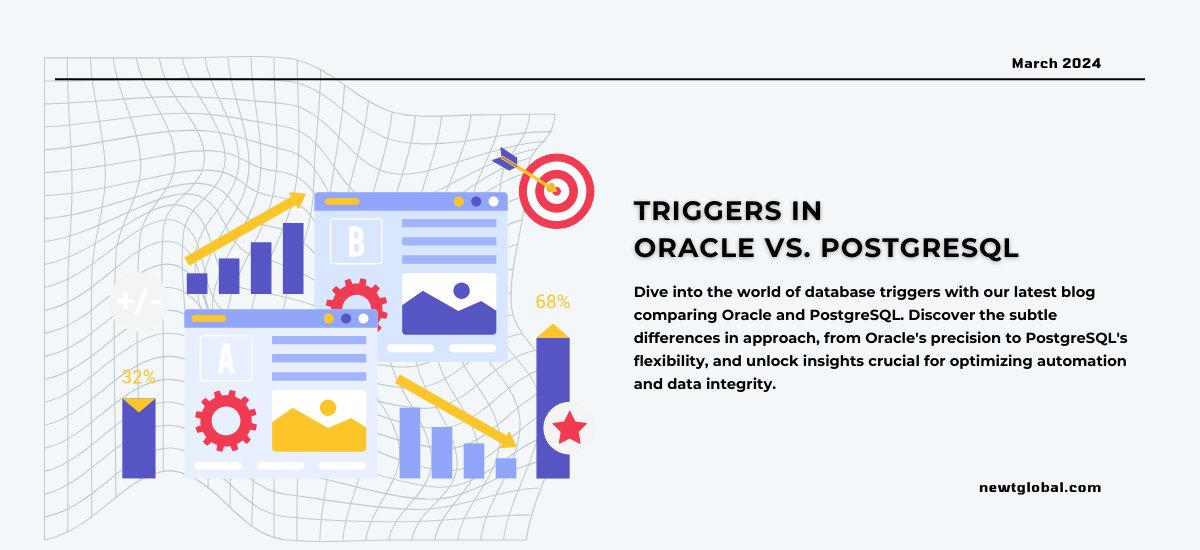
Triggers are like automatic helpers in databases. They help make sure data stays correct and can do tasks by themselves, following set rules. Think of databases as big, organized spaces where your digital information lives. Oracle and PostgreSQL are two big names in this world, each with its own special way of handling these helpers. Let’s deep dive into Triggers in Oracle vs. PostgreSQL.
Understanding Triggers
First off, triggers are bits of code that do something automatically in your database, like keeping track of changes or making sure rules are followed. They work in the background, so you don’t have to manually check everything.
Oracle’s Way with Triggers
Oracle is known for being solid and detailed. It treats triggers like a conductor with an orchestra: everything works together smoothly. Here’s what Oracle offers:
-
- Different Kinds of Triggers: Oracle has many types, such as those that work on individual rows or the whole statement, and some that work before or after changes are made.
- When Triggers Work: You can set exactly when a trigger should do its job, like before or after data is changed.
- Dealing with Changes: Oracle has a smart way to handle when data is being updated, but it can make designing triggers a bit complicated.
PostgreSQL’s Approach
PostgreSQL sees triggers as a way to link data changes to actions. It stands out by:
-
- Combining Triggers and Functions: Triggers use separate bits of code called functions to decide what to do, giving you a lot of freedom.
- Different Programming Languages: You can write trigger logic in several programming languages, making it very adaptable.
- Seeing Changes with Transition Tables: For some triggers, PostgreSQL lets you look at a snapshot of changes, which is great for tracking and reviewing data.
Comparing Oracle and PostgreSQL: Oracle vs PostgreSQL
When we put Oracle and PostgreSQL side by side, we see:
-
- Different Styles: They use different ways of writing and structuring triggers, reflecting their unique approaches to database management.
- How They Handle Data Changes: PostgreSQL doesn’t limit you with certain restrictions that Oracle does, offering more freedom in some areas.
- Programming Languages: PostgreSQL lets you use various languages, while Oracle mainly sticks to its own (PL/SQL).
- Transition Tables: PostgreSQL offers a special feature that Oracle doesn’t, allowing you to work with data in new ways.
Choosing Between Oracle and PostgreSQL
Deciding between Oracle and PostgreSQL is like choosing between two great books: each has its own strengths and style. It depends on what fits your project best – the strict and detailed approach of Oracle or the flexible and innovative PostgreSQL. Both can help manage your data efficiently, but in different ways.
To sum it up, diving into triggers helps us understand how Oracle and PostgreSQL offer unique tools for automatic tasks and data integrity in databases. Whether you’re a developer or a database administrator, knowing these differences can help you make the most out of your database.
Ready to revolutionize your database infrastructure?
Dive into the future with Newt Global DMAP, our world-class product designed to streamline the mass migration of Oracle Db to cloud-native PostgreSQL. Experience a transformation that promises speed, efficiency, and cost savings like never before. Don’t let your organization get left behind in leveraging the most sophisticated data architectures. Visit us at newtglobal.com to learn more about how we can elevate your database solutions to new heights. Have questions or need a tailor-made migration plan? Reach out to us directly at marketing@newtglobalcorp.com. Embrace the power of Newt Global DMAP and migrate faster, better, and cheaper today.
